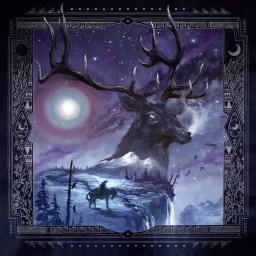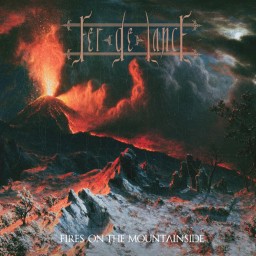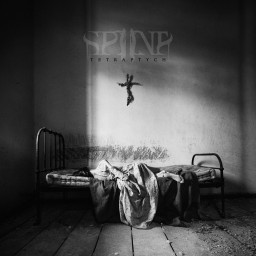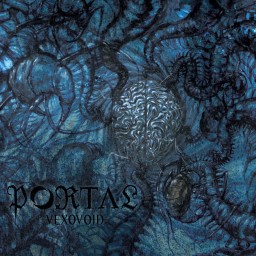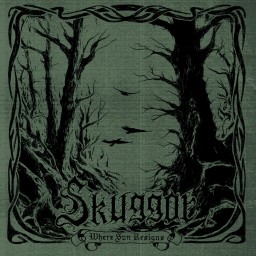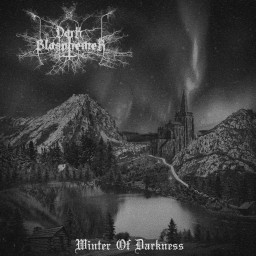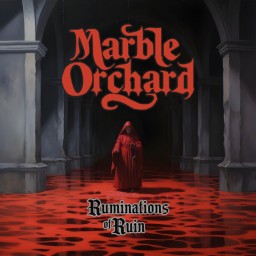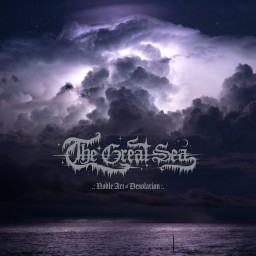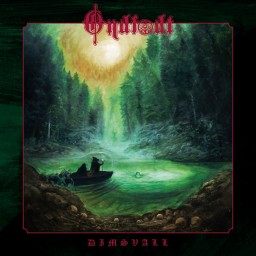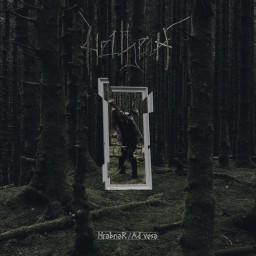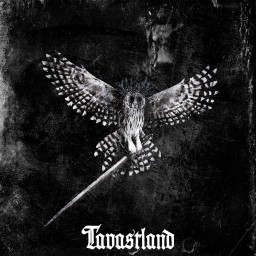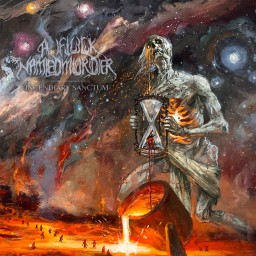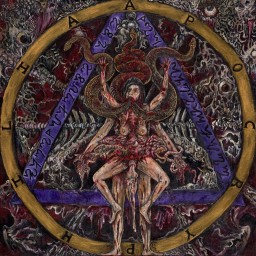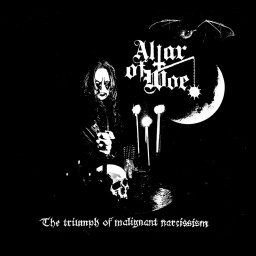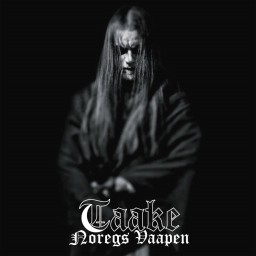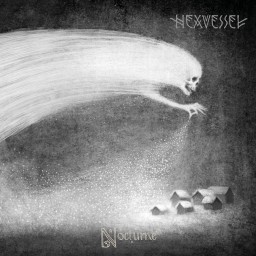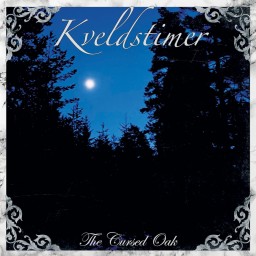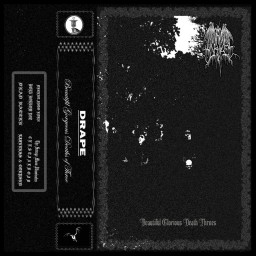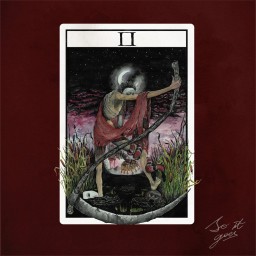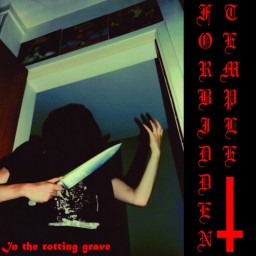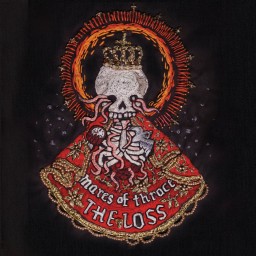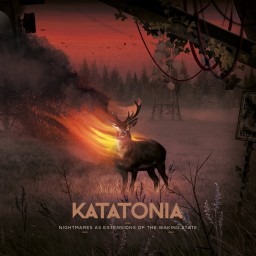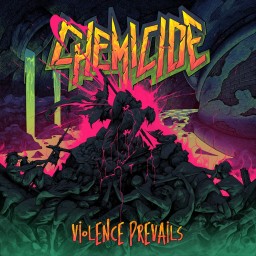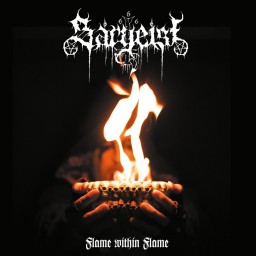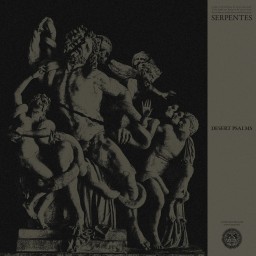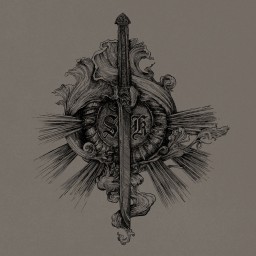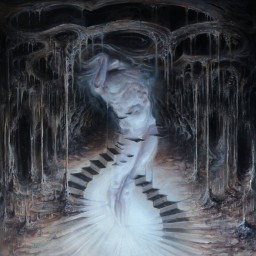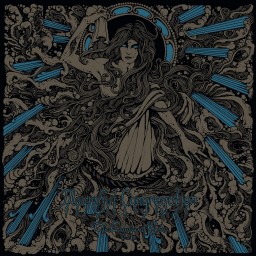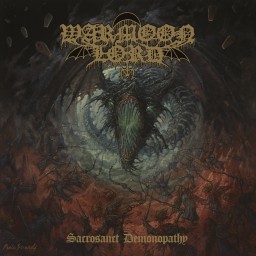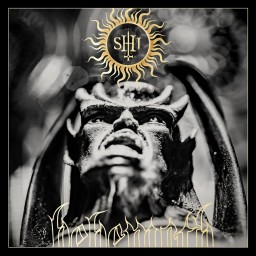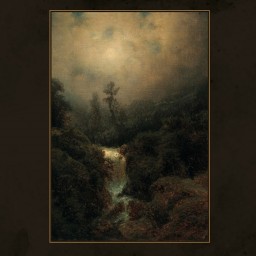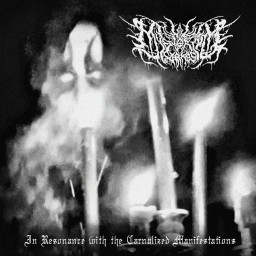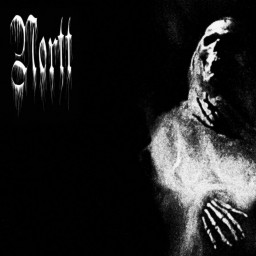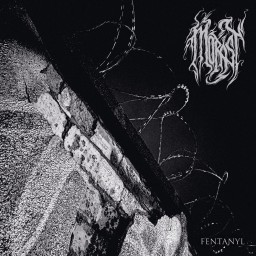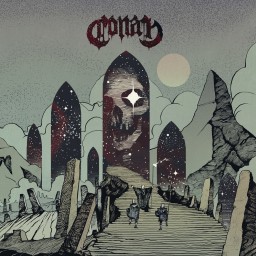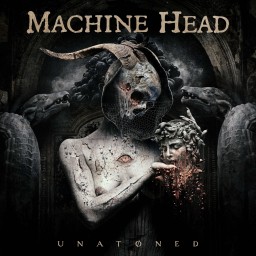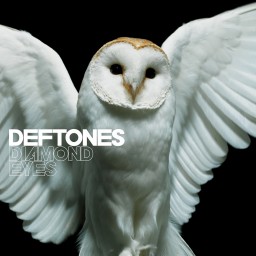Vinny's Reviews
It feels like Blackbraid has been around forever, when in fact it is just a mere three years of existence for the indigenous black metal solo artist from the Adirondack Mountains. Despite my confusion over how long Blackbraid has been around, this is the first time that I have gotten around to listening to one of his albums. I was interested in the beginning but then (bizarrely) I got pissed off with the constant flood of marketing emails I was getting from him and so I senselessly punished him and myself by not listening to his albums. What a twat I am sometimes.
Nowadays, Vinny comes with some degree of in-built maturity about him and so can understand that for a fearsomely independent artist such as Blackbraid, who must have a queue of labels after him by now, promotion is key to his success. The other element that is central to being successful of course is the quality of your music and album number three certainly delivers on that front. Unafraid to fire some leads into the equation, Sgah'gahsowáh can work beyond just tremolos and blastbeats. His racing and urgently paced tracks carry some real attack behind them. Channelling as much Uada as he does Immortal on tracks such as ‘The Dying Breath of a Sacred Stag’, there’s a fair old bit of power behind those punches that he throws.
As we would expect from a largely atmospheric-black metal act, there are fleeting acoustic passages and flurries of natural sounds akin to Panopticon, alongside the more direct and aggressive black metal sounds. From looking at the eye-catching artwork on the cover (a combination of border work by Adrian Baxter and imagery form Adam Burke) it is hard not to expect some of the more spiritual aspects we get here. There’s no surprises on the album. From a brand perspective, the listener should find exactly what was advertised is delivered.
My first impression of Blackbraid is that this is an incredibly well-written and skilfully performed record. Drummer Neil Schneider puts in a shift behind the skins that supports the rest of the sounds well enough. The guitar in the main is the element that shines however, alongside those harsh vocals they make quite a combo with the melodic leads and harsh riffs to boot. I guess I could criticise the three instrumentals as starting to get a little old by the time we get to track eight. However, they do all serve a purpose and aren’t directionless sounds of motion like whatever it is that is going on with the opening of the latest Drudkh album. There is a much richer melodic bm vein to the record than I was expecting based on previous reviews I have heard of his work. Whilst I won’t go over the top with praise for Blackbraid III, it is a good album. Its use of interludes aside, it is structurally sound and although I will probably not rush out to buy a physical copy I will try to make up for some lost time with Blackbraid by enjoying this record many more times in the coming weeks, months and years.
Genres: Black Metal
Format: Album
Year: 2025
Fer de Lance present a problem for me in that they play a with very traditional heavy metal sound when approaching their music. Of course, I publicly left that sound behind a long time ago when exiting The Guardians clan. There are times when listening to Fires on the Mountainside when I begin to doubt its doom metal credentials altogether if I am honest. Yet at the same time, there is such quality to this record that I cannot help but put aside my dissatisfaction and be drawn into the joys of the record. I have seen their sound described as folk-prog in some reviews as well as mention of blackened tinges in others. I can see both most definitely, based on this record at least. Influences aside, it is easy for me to appreciate the epic metal authenticity of Fer de Lance’s sound as it is a stalwart of the tracks collected here on this record. Wherever the album does tread over the seven songs presented, the listener can be left in little doubt as to where the heart of the band truly lies.
It is good to hear the Viking metal elements of Bathory protruding through in places, and with some spurts of Candlemass alongside the more modern similarities of Atlantean Kodex we are soon finding ourselves transported around the world of metal with Fires on the Mountainside. The keyboards really drive tracks like ‘Ravens Fly (Dreams of Daidalos)’ whilst soaring leads and epic yodelling vocals continue to embellish the grandeur of the sound. Vocally, I am most reminded of King Diamond. Which, given he is one of the most overrated vocalists in my metal in my book, could be considered a slur somewhat. I find the sound of the higher pitched vocals on this record to be far more endearing though and the songs to be better structured than most Mercyful Fate/King Diamond tunes I have tolerated over the years. I sense there is more than one singer on this record though (or just one with amazing range and heavy use of overlays). ‘Death Thrives (Where Walls Divide)’ is probably the best example of this great vocal display.
As tracks like ‘The Feast of Echoes’ prove, simple structures can still make epic metal. Here is a big Bathory, stomping track if ever there was one. Straight and to the point, this is one of the most memorable tracks on display here and has great longevity as a result. Should there ever be cause for me to consider revisiting some trad heavy metal then there is a good chance that this record could be the trigger for it. Yet doubt does still creep in. There is a very well-established format to Fires on the Mountainside and to some degree it does become repetitive at times. Maybe isolated to my own battles I accept, but I am kind of “epic exhausted” by the time we are getting to the final couple of tracks on the record. There’s nothing wrong with them at all, but perhaps they are a stretch too far for me still at this point of my listening habits. However, Fires on the Mountainside has still surprised me and has been kicking around my rotation list for a good few weeks as a result.
Genres: Doom Metal Viking Metal
Format: Album
Year: 2025
Former Ne Obliviscaris vocalist, Marc Campbell has joined forces with Virgin Black’s, Sesca Scaarba to create funeral doom outfit Spiine. Boasting none other than Lena Abé (My Dying Bride) on bass and current Opeth drummer, Waltteri Väyrynen on their debut record, Tetraptych has a lot of class involved in it. As if this star line-up was not enough, the album also features the work of late Norwegian photographer Lene Marie Fossen on the cover. The emancipated figure in the bed is Fossen herself, a lifelong anorexic who was a master of self-portraits and used her art to reflect human suffering. Fossen died in 2019.
Tetraptych then has it all it seems. Some well renowned artists in metal, a sense of grandeur in its use of orchestration, an incredibly harrowing and personal image adorning its cover and a run time of over an hour. The stage is set nicely for some funeral doom folks. And funeral doom we do indeed get. Agonisingly slow riffs and melancholic leads fester in the fetid air of album opener ‘Myroblysiia’ (yes, every song title has a double ‘I’), whilst the drums remain present but unintrusive in the background. All is shaping up nicely until around eight-and-a-half minutes into the track when some crude clicking rhythm takes hold and completely derails all the excellent work done to that point. I am unsure if this was intentional or not, but it is disorientating to say the least.
Taking the track title at its meaning (at least the correctly spelt version anyways), myroblysia is the scent that emanates from the bodies of saints. The odour of sanctity is said to come from the wounds of stigmata according to the Catholic Church. Despite the ugly interruption, this track carries that air of sanctimonious grandeur about it. Clocking in at over fifteen minutes long, it takes a couple of turns along the way, holding the interest still throughout. That orchestration is obvious throughout the album and is sprawling in the tapestries it weaves. Building tracks subtly alongside Campbell’s varied guttural and raspy vocals, the arrangement of the instruments feels very well thought through. There is plenty of space to be used and the urge perhaps to fill all of it is thankfully resisted. At the heart of Tetraptych is a fathomless void that mere mortals cannot fulfil. Whilst its four panels are very clearly framed (four tracks), there are expanses around each of them that can only resonate with the echoes of curses. Lost in all this sadly is Abé, which seems a waste.
The performance of Väyrynen needs noting though. He plays a clever and important part on the record. I doubt anyone else could have made such a measured performance without losing overall presence. His accomplished, patient and thoughtful style is what allows the atmospheres to really shine without being overshadowed by them at the same time. Tracks like ‘Glaciial’ just simply would not work without him. At the very core of the Spiine sound though are the cavernous vocals of Marc Campbell. The attack of the opening of ‘Oubliiete’ is led by his explosive gurns and the thick atmosphere that ensues sees his deathly rasp ride atop of it. When combined with the crushing riffs of Sesca the results are phenomenal, if not always sustained for long enough for my liking. As you would expect from a funeral doom release, Tetraptych is a punishing and challenging listen. It rewards in abundance also, especially once tracks have built into their full flow. It is a lot still for me to take in across one sitting, and I do find that splitting the record in half as two separate listens does increase my enjoyment of the album more. Fans of Evoken and Loss, should find lots to enjoy here.
Genres: Doom Metal
Format: Album
Year: 2025
In choosing Portal’s Vexovoid for the feature release this month I have challenged myself to try and put into words exactly what it is that appeals to me about this frenzied, chaotic and utterly aphotic style of music. In terms of what it wants to be seen as, Portal is androgynus to me. It is of indeterminate form. An almost alien being that inhabits a permanently chthonic state, and whether it is necessarily esoteric or arcane in who it connects with or not, ultimately, I take comfort in the maelstrom that is the sound of Portal, with Vexovoid being probably the pinnacle of the Australians own brand of bedlam.
It is not that I like chaos. I have a very chaotic and stressful job (though the people that I work for term it as a ‘dynamic environment’, of course). Whilst precisely zero of my nerves are stretched into that taught and fractious state by Vexovoid, there is a sense, from a love extreme music perspective certainly, that when the record is playing, I am somewhat at home in that churning mass. I have said elsewhere on MA about how my love of metal has created the notion for me that the music is mine, purely for me. Therefore, when I find an album like Vexovoid, I cannot help but form a smug grin on my face. The sheer sense of identity it gives me is so pleasing that I am happy to watch form, structure and even the general architecture of music in its basest form, burn around me.
The promethean values of Portal, therefore, hold great appeal for me. Tracks play like a series of paroxysms, scathing and monstrous outbursts of wonderfully transgressive noise. The sound carries an infection. Not in a catchy or hooky nature of course. A genuinely verminous level of virulent horror, and I fucking love that bravery. This is not just admiration for artists going out and committing their true form to record though, there is appeal also in them being able to do it memorably. I can hear parts of Vexovoid in my head when I concentrate. It doesn’t drift into my head like other music does randomly most mornings, I must seek it out. Seemingly it lies there dormant, like a slumbering beast, exhausted from its years of torment and so only able to give me short bursts of its fury unless left to recharge itself for prolonged periods.
I can easily see how overwhelming this album can appear, indeed that sense of foreboding is very much part of the appeal for me. Yet even I can find fault with Vexovoid. The familiarity of the tracks, in terms of sticking to a very consistent sound does start to feel overbearing as the album crawls on. Attempts to control and vary the pace are clearly made, and for the most part, they do deliver. Yet for all my love of the album it is guilty of a lack of variety. The subtle changes to vocal style and tempo are noted, yet they do little to steer the rating to a perfect mark. Then again, as I have already stated, I do not come to Vexovoid for anything more than its glorious chaos. No frills are needed really, I guess.
Genres: Death Metal
Format: Album
Year: 2013
Residing in a cold and yet familiar place somewhere between the ambient trappings of Burzum and the more medieval grandeur of Satyricon, Skuggor wears many influences on his sleeve throughout his third album, which is my first experience of the Australian who now resides in Sweden. Those deep, chiming notes that punctuate opening track ‘Writhe’ immediately resonate through the dark emptiness of the atmosphere of the record. Those ghastly vocals maraud and worry the listener with a menacing sense of triumph.
Things take an immediately more melodic turn on the appropriately named ‘Meditations Upon the Roots of Infinity’. A more laid back, slower tempo is embraced on this one giving a contemplative nature to the sound. The drums threaten disruption, but never quite get there. Appearing as almost ritualistic behind the thrusting notes of the guitar and the light synths that accompany them. After just two tracks it is clear why Where Sun Resigns caught my attention so quickly. There is depth and variety here, with a record that still sticks to the core black metal aesthetic. There is a balance to things, a level of control applied that shows maturity.
The man behind Skuggor (Matthew Bell) is active in a lot of other projects it seems. Ranging from dungeon synth to post-metal/post-rock, from atmo-black to thrash metal as well as funeral doom, folk metal, avant garde and symphonic melo-death metal, it is safe to say that Mr Bell has quite the repertoire to play with. The danger would be for the fusion of all those elements across the wide selection of bands, projects and collaborations he is involved in to permeate into one horrible mish mash of styles. However, as I note above, there is a firm hand on the tiller in Skuggor and having set his stall out early on, he sticks to the classic sounds referenced earlier on in the review.
There’s an overall sense of calm that I get from this record. Even in the more urgent moments it never quite sets the pulse racing. This is well executed black metal that knows the content it wants to project and focuses on delivering that to a high standard. ‘For Every Wound A Hymn of Growth’ is the longest track on here, but it stands out for its clever arrangement as opposed to just its actual length being the only thing of note. The nastiness still comes through though, mostly as a by-product of the vocals as I said. But the evil in the album is framed in this dark ambience so well that it somehow emphasises it almost organically.
Genres: Black Metal
Format: Album
Year: 2025
Argentine black metal has got to be one of my more niche geographical listening habits. But with the likes of Brazil and Chile now regularly appearing in my listening explorations, it seems natural that other parts of South America start to cross my radar. Dark Blasphemer seem to be a long-standing outfit having formed way back in 2011 and here releasing album number three some seven years after their last album, Suicidal Catharsis.
All three albums to date have been released independently, but based on Winter of Darkness, they could easily find themselves a record label if they so wished. This is grim black metal of a suitably depressive nature but has a lot more to it than just a tape machine on record and some instruments being murdered in the same room. There might only be three of them in the band with one of them doing both guitar and drums for this record, but the sound overall is strong. All the instruments standout in the mix nicely enough, with even the bass twanging in now and again from behind the scathing riffs.
Although most definitely rooted in black metal, Winter of Darkness possesses some death metal elements for variation here and there. Those galloping dm riffs on ‘Lord of Misery’, show the band stretching their legs early in the record. Whilst the picked tremolos of ‘Legal Fiction’ is pure Burzum worship, complete with the chants for good measure. Overall, there is nothing here to note that this is not a record released by a band from Norway and the authenticity to the sound of the album is testimony to the band members experience to date. I sense there’s a lot of years in the band and that maturity comes across well in the music.
It would be remiss of me to indicate this would place high in my year end list in five months’ time. However, I must acknowledge the genuine black metal article when I hear it, and Winter of Darkness ticks all the boxes for being a veritable feast of the dark arts. Not too showy but also devoid of shabbiness at the same time, there is hopefully a lot more to come from Dark Blasphemer. For now, I can be satiated well enough by this though.
Genres: Black Metal
Format: Album
Year: 2025
2025 has seen me really stretch my legs in The Fallen clan for the first time. According to my spreadsheet I have hammered through ninety-four releases from this year alone. Ranging from sludge through to death/doom metal, there’s a healthy section of doom metal in there also. The two most under-represented sub-genres are clearly drone (not my bag) and gothic metal. The latter category has seen CoF make a couple of splashes in the pool before dropping out of rotation quickly enough, and to be honest there’s been little of anything else that way inclined that I have picked up on. A couple of weeks ago, that changed with the discovery of the bold artwork that adorns the cover of the sophomore release from San Antonio band, Marble Orchard.
The band have a dramatic logo, dressed in gothic font, much like the album title. Then we have the just as dramatic artwork, with its bold use of red against a backdrop of grey and black. Ruminations of Ruin certainly grabs the attention visually in the first instance at last. Musically, the bands sound fits the logo and artwork perfectly. Dripping with Type O’ Negative style vocals and littered with Swallow the Sun and My Dying Bride musings, it is soon clear that no curved balls are being served here. The vocals have been an on and off challenge for me in all honesty, and right now (for this review at least) I am onboard with their bellicose nature. They do sound a bit goofy at times still, yet for most of my listens through they have certainly settled nicely with everything else I am hearing.
It is hard still to not get too drawn into them ahead of the other activity that is being performed alongside them. The guitar sound is thankfully prominent also which does give opportunity to tear your ears away from the vocals for a few sections of each track. The riffs are big and crunchy, and the leads are sorrowful forays, leaden with melancholy as we would expect. The percussion does appear to have some challenges with the mix (what is going on with that jangling noise that intermittently appears on tracks, or is that just me?), but still the drum work is commanding. The organ on tracks like ‘Anti-Mirth (Anhedonia)’ adds lashings of atmospheres and that taught sounding bass also helps here.
The main problem I have with Ruminations of Ruin is that it is just too long. The intro track is instrumental and takes forever to get through and then another two instrumentals at nearly a minute each at later points in the tracklisting don’t help with this sense of design triumphing over content a little. I get the album is a bold undertaking (I have called out all the signs of this already in the review), but it does seem that the band have gotten a little carried away with themselves here, and a trim would have helped. That having been said, there is still much to enjoy on the record. However, it has taken more than few listens to bed in, so it is not an immediate type of a record for me.
Genres: Doom Metal Gothic Metal
Format: Album
Year: 2025
German black metal duo, The Great Sea are relative newcomers to the scene (at least in this guise). They play a turgid style of black metal that lurches its way along, its feet getting the occasional application of atmosphere and ‘post’ section as their only balm on this at times laborious journey. The vocals deploy a pagan style that works well against the musical backdrop, and as a complete package, this debut album does display an obvious degree of maturity in the performances
Where the album does fall short though is in the memorability stakes. I must be on my tenth listen through of the record now, and whilst certain elements are bedding in, they only seem to become familiar in the immediate moment they occur. I feel this maybe because the album creates too much space for itself, certainly more than it can fill on a consistent and interesting basis. A pattern quickly forms of atmospheric and ‘post’ sections being bridged by more aggressive passages, which is a logical order to be ran. However, over the duration of the whole album, the knock-on effect of this is a sense that the message the duo intends to deliver simply takes too long to arrive.
It would be unkind to refer to Noble Art of Desolation as meandering yet structurally speaking tracks do appear to outstay their welcome. Whilst I could not call out any bad tracks, equally there is a shortage of overall direction to most of the tracks here. We should keep in mind that this is debut release of course, and maybe that level of maturity I called out earlier on in the review has me expecting more compositional aptitude than I get. Still though, I cannot fight the fact that the record falls more than a little short of where it could be.
Genres: Black Metal
Format: Album
Year: 2025
As full-frontal attacks go, Dimsvall is head and shoulders above most releases so far this year. For a band of just four members Ondfødt manage to make the din of a prison riot at times. If it is a no-nonsense approach to black metal that you are looking for then you will not go far wrong with this, the Finns fifth studio album. Yet, at the same time, you should not enter into the record just believing that this is smash and grab, blastbeat black metal. There are depths to Dimsvall that deserve exploration. Melodies to enjoy, individual instrument performances to appreciate and some very well-built structures to admire also. The acoustic intro is an early sign of this, giving a medieval mystery to the start of the record.
The fleeting acoustic sections that pop up on the record do nothing to mute the offensive textures of the album though. If anything, they glorify the aggression inherent in Ondfødt’s sound. Listen to the horns on ‘Svartsyn’ and tell me you don’t want to go march with an undead army. I tend to think of these sections as being along the same lines as the medieval, celebratory tales that told stories of battles fought and wars won in times of yore. Of course, they do also show the depth of the talent involved. With Owe and Tommi already responsible for another record that is in my top ten this year (Void of Hope ‘Proof of Existence’), I personally am not surprised by the quality of the nine tracks on offer here. The production job does the instruments justice, even if the drums do suffer a little from an effect of them being shrouded somewhat at times. The vicious rasp of the vocals really shines though, and the guitars manage to pick out their own spot in the mix too. The leads are especially good throughout, which is refreshing to hear during the more furious-paced tracks.
There are death metal tinges to the blackened proceedings that you can catch glimpses of in good measure. Ondfødt manage to hit that sweet spot of adding some depth to the fury of their black metal by beefing up the riffs, which makes for a blistering and bruising experience in equal parts. Yet they by no means repeat the same model or methodology from song to song and can create just as much menace on less heavier tracks such as ‘Futuria’ which builds a sense of growing threat to an almost overwhelming crescendo. Meanwhile, black metal bangers like ‘Grymhejtins ansikt’ and 'Bakom blekna skuggor' more than get the message across in the most direct means possible.
Whilst I cannot quite put my finger on it, there is a charm to this record that is only obvious when I return to it. I can remember bits of it when I am post-listen, but there is nothing specifically memorable about it overall. When I am sat in front of it, I like most of what I am hearing. It is vibrant with a pagan undercurrent at times, whilst staying as grim as you like for the most part still. Whilst not flawless, it is hard to criticise at the same time. It most certainly is not a record to push any boundaries, and I like that safety aspect to it, I guess.
Genres: Black Metal
Format: Album
Year: 2025
Now then, here’s an unexpected find in 2025. An album that reminds me of Enslaved, circa the noughties. Still with some of that Viking earthiness about them, but with an obvious smarter edge to their sound, Helheim’s latest offering takes me back to probably the last time I enjoyed an Enslaved record. With the pagan traits of Kampfar added into this mix that also has a rich melodic vein to it also (Windir, springs to mind) and the near clunky transitions of Borknagar, HrabnaR / Ad vesa soon starts to offer a lot in the way of charm to the experienced metal fan. Helheim themselves have been around as long as Enslaved (well, barring a year) and longer than Kampfar or Borknagar, so are hardly new to these sounds of course.
Album number twelve is described by the band as a “groundbreaking release” in the sense that the album was written in two equal halves. One half by V'gandr and the other half by H'grimnir, giving a “bold evolution” to the bands established sound. I will have to take their word for it as I have never listened to any other album by the band, so I can only comment on what I find on here. Whichever half of the record it is that I listen to, Helheim are unafraid to experiment with their established sound. With Hammond organ and grand piano both listed as instruments used on the record, we should not expect endless blastbeats and howls of icy fury throughout.
In this regard, there is an air of predictability to the experimental elements of the sound. Knowing they are traveling an expansive path does not necessarily result in the view being all that unfamiliar in the long run. That’s because they can stay true to their own roots whilst treading in the footsteps of the other mentioned bands already listed in this review. I do not say this as a criticism of the band or indeed the album, as I enjoy the record very much still. It feels accomplished without being cocksure, yet at the same time to call it a “groundbreaking” album seems a stretch in my opinion.
It is well played and produced to a high standard also, doing justice to the various ingredients of the music in terms of letting them all have their moment in the limelight. At forty-four minutes it does not feel too long and still manages to leave the impression of being a well-though out set of compositions that aren’t hurried along at any point. Whilst I cannot pretend to get lost in it, and I do struggle to retain a lot of what I hear (maybe it is a little too much like Enslaved on the backend of the album in particular to stimulate my brain cells much), it is a record that has seen me come back to it out of pure entertainment value. Whilst I may not remember it all, I do still recall it is a good record at least.
Genres: Black Metal Viking Metal
Format: Album
Year: 2025
Somehow flying under my radar to date, Finland’s Havukruunu have been causing waves in metal for a few years. It has taken me about ten listens to Tavastland before I could order my thoughts into some semblance of coherence, such was my surprise at just how much I enjoyed their unique brand of imperious blackened heavy metal. I mean, I have heard pagan black metal before, Moonsorrow and Kampfar immediately spring to mind, but nothing quite feels as invested as Tavastland does and certainly nothing sounds as passionate as it does. Telling the story of the Tavastian people’s rebellion against the Catholic church in 1237, the album carries the angst and unrest of the story well on its broad shoulders. The storytelling as a result carries an authenticity a sincerity even, to it. Far from relying on furious blastbeats and raging tremolos, Havukruunu construct the narrative with well-thought through structures. Unafraid to lean on melody and catchy, chant-driven chorus lines to captivate the listener, the Finns show a versatile and pleasing array of variety across the eight songs here.
I am captivated by the time the chants start on opening track ‘Kuolematon laulunhenki’, only to be further hauled into the baying mob by the mining riffs of ‘Havukruunu ja talvenvarjo’. The choral elements of the latter track disperse into the song unexpectedly, without dispelling the more aggressive and driving rhythm that constitutes the main part of the track. I think this is one of the key areas of success for Tavastland. Despite showing a clear penchant for the more extreme parts of metal, the band always keep that apron string back to that very traditional metal sound that their art is built on, very much in reach still. The pagan influence does not get lost either, the title track being heavy with that content across both instrumentation and vocal context also.
There is a cello, and numerous sections of keys deployed on Tavastland, meaning the interest levels are easy to maintain throughout for me. I cannot pretend to be pagan metals biggest fan but when an album is put together this well, it is hard not to be onboard. The lead work is sublime. Richly melodic and still completely unintrusive, in fact it is most welcome when it does make an appearance on tracks. The notes all sound crisp and clear against the more urgent backdrops of the music they are so often layered over. With such a heady sounding review thus far, it is perhaps unsurprising that I have not hinted at any negatives. The truth is, I don’t have any criticisms, no duff tracks and no moments where I reach for the skip button. This may be down to it being an excellent album that moves at such a relentless pace that you cannot help but be taken along by it. Is the last track a stretch too far at nearly eleven minutes? Well, maybe for some. However, to me it sounds like a final glorification of the great content that precedes it and so I love it just as much as I do the rest of the record.
Genres: Black Metal
Format: Album
Year: 2025
This year’s exploration of new releases has seen me approaching the early signs of burnout as we reach the halfway point of 2025. With some two hundred and fifty albums already listened to, many of which soon got dismissed before ever being considered worthy of a second listen, it was starting to get a little tiresome. I am grateful though of the releases that still transcend this creeping sense of tedium. The ones that manage to still leave more than a mere dent in the plethora of releases in the year so far. These albums and EPs have something about them, an essence of some strength beyond their grim content and corpse-painted faces. Whilst they don’t always have to be soaked in progressive tendencies, albums such as Incendiary Sanctum are what have kept me largely going this year.
These Canadians come from a strong pedigree of black metal bands, with the country already being responsible for giving me Spectral Wound, Nordicwinter and Panzerfaust, to mention but a few. They are different to pretty much most of what I have heard come out of Canada to date though, deploying a strong death metal element as well as having a post-metal vein running through their sound. It is easy to look at an album with track lengths that extend to nearly nineteen minutes and be discouraged. Indeed, I would go as far as to say parts of Incendiary Sanctum look daunting. However, my experience of these lengthy tracks has thankfully not been one of progressive wankery or grandiose showmanship. Even without that imposing nature to performances it is clear beyond any doubt that everything is remarkably well played here. Equally the album is arranged very intelligently, and yet even with this order to proceedings, especially with that post-metal element being so strong, the dynamics of the sound do not suffer. Arguably the most obtuse thing about the band for me is their ridiculous name. A Flock Named Murder? Really?
The four tracks that run over the hour and three-minute duration are all delivered with a maturity and a sense of patience being applied to the song development. This is not just four tracks of post-metal that grow into raging black metal crescendos at the halfway point, to be then taken into some death metal section before fading away into more minimalist pastures to end. The structures here are varied and are kept interesting throughout the longer than usual runtimes. Think the clever songwriting of Cult of Luna coupled with the innovation of Enslaved and then throw some Agalloch in there to temper everything and you are absolutely on the right track. I would argue that this is more entertaining than anyone of those bands in isolation (notwithstanding that I am not Agalloch’s biggest fan by any means) and being able to take the better elements from just three such well established artists show a talent in itself of course.
Incendiary Sanctum is one of the better-balanced releases that I have heard in 2025. Where it does lean into prog it does so without managing to lose me. The death metal element is strong throughout and whilst there is little room for black metal, what is here is still of excellent quality. It does start to lose some traction with me if I listen in one sitting and I do find that splitting the album in two does tend to reap the better rewards for me. I cannot think of anything else I have heard this year to compare this with and as such it stands out from the pack well in what has already been a very busy year.
Genres: Black Metal Post-Metal
Format: Album
Year: 2025
Featuring a cover, every bit as horrific as the content held within, Veneraxiom’s debut full-length is a somewhat aphotic affair in the sense that there is zero sign of light, hope or positivity throughout its nine hellish soundscapes. This is an album made for people who accept that there is no unspoken rule to the universe around fairness. Life is cruel and so is Veneraxiom’s music, so fuck you all. Leaning towards death metal more than being simply conventional black metal, Apocryphilia is ironically far from being questionable or inauthentic. The band achieve exactly what they set out to from where I am sat listening. Torturing the listener with crude black ‘n roll elements and then terrifying us the next with screams of unfathomable human suffering the next, this is an album that has no hidden depths and is stronger for it.
The trio hail from LA and have released a couple of EPs and a compilation to date (along with a split with Grand Bewitchment in 2023) before committing to a full album release some six years into their existence. Tracks lurch around, shrouded in morose melodies and mining riffs. Spoken word excerpts from films make appearances here and there to emphasise the direction of the music a little more clearly. There is a mocking undertone to this album, the sense that Veneraxiom are laughing at the order of society, its cultural norms and the comforts of modernity. Apocryphalia is not as uncomfortable a listen and it is supposed to be though. It has a punky catchiness to it in places, which although smothered by relentless blastbeats at times, is most definitely always around the mix of things.
The album’s Achilles heel is its longevity factor for me. By the time I get to track five, I get it, after which point I am zoning out more than a little bit. Whilst I do understand why a bit of variety here and there would kill the aesthetic they are trying to create; the spoken word sections don’t inject enough extra for me to focus on. Whilst ‘Et Demonio Ad Aternum’ does try to dial up the intensity immediately after the midway point, throwing some chaotic lead work into the music to jolt the concentration back on point, it is only a momentary reprise. For the final three tracks of the album, there is a sense that the band are just coasting to the end. In their stronger moments, I am reminded of Grave Miasma which is no mean comparison to be able to make, right? If we could stray into that brand of ordered chaos, then I feel I could stretch the rating on Apocryphilia somewhat. As it stands though, I will simply make note of them ready for if they get to a sophomore release.
Genres: Black Metal
Format: Album
Year: 2025
I purchased The Triumph of Malignant Narcissism after just one full listen through being completed. This happens rarely with me, but with my renewed use of Bandcamp, the ease of purchase was just too hard to resist when faced with this fantastic slab of frantic black metal. Simply put, the record ticks all my bm boxes, tingles all my necro nerve endings and scratches those riff craving itches nicely. All the work of Илья Львов (or Elias as he is known), this one-man project has one other record to his name, which I am yet to experience but it most certainly be going on the to do list soon enough based on my experience of this record at least.
When I go looking for a black metal record, as in a real black metal record, The Triumph… is the exact type of record I want to find. Full of vicious riffing and strained keys, with ghastly vocals too boot. The percussion is just awash with that shimmering hue of hi-hats over the rest of the music, but they never invade the other elements. The rampant riffs of ‘Necromancer’s Night’ shows this perfectly, the riffs get front and centre at a couple of points and it is glorious in underlining the beastly nature of the track. Despite the raw approach here, I sense some calculation in the arrangement of tracks as the album does only appear to grow in stature as it blazes its way along to completion.
Those dungeon synth elements are well executed also. Unafraid at times to let them take centre stage, they create a distorted and near dizzying atmosphere. They play almost sub-consciously across the record to my ears, plaguing the rest of the instrumentation in the background like nefariously evil children causing mischief in the corner of the studio with a synthesiser that is not plugged into the mains and is low on battery power, but they play the shit out of it all the same. Lovers of the second wave can park their cars along the roadside if the car park is full as you most certainly would not want to miss out on this record.
Variety is here still; it is just kept to a minimum. Occasional strings (‘The Darkest Path’, ‘The Ballad of the Scorn’s Guardian’) add further atmospheres alongside the much-discussed synths, but the record is still at its best when in full flow. ‘Sadistic Grin of Evil’ is the standout track for me. This is straight up, no fucks left to give black metal, delivered in a riotous and offense manner. I can almost see the sadistic grin in question, stretched across the face of Elias as he sneers his way through the track. You could easily find more necro/lo-fi sounding bm I am sure, but production values on the record are suitably low enough, intimating that ‘recorded in my bedroom’ vibe perfectly.
Altar of Woe just challenged my current top bm release of the year (even though Gràb is very much a different style of bm) and it is a strong contender to remain there ahead of the likes of Drape even. All hail!
Genres: Black Metal
Format: Album
Year: 2025
The enjoyment I found in Nattestid ser porten vid... from Taake, released all the way back in 1999, has never been topped by anything that I have heard by them since. Considering my praise for it (a generous 4.5 stars, no less) with its excellent songwriting, I could have been forgiven for wondering how good things would get on subsequent releases. Admittedly my coverage of the rest of the discography is patchy at best, but even on the more casual listens to the likes of ...Bjoergvin... or ...Doedskvad those albums have not lived up to being anywhere near the debut release's standard. My main criticism of Stridens hus was that the rock elements had gotten just too brazen and there was a regurgitation of ideas that had already had more than enough airtime over the years.
Noregs vaapen appears to be an earlier version of the same issue. Whilst I can acknowledge that it sounds nowhere near as sterile and dull as Stridens hus, it most certainly has the same underlying issues. Gone are the clever arrangements of the debut, replaced instead by ad-hoc instrumentation and random sections. It seems unrealistic to say that such a shadowy and controversial figure puts out music for clickbait purposes, yet Noregs vaapen just does not sit well with me in terms of being a black metal album with kvlt credentials galore. That probaby sounds more elitist than it is supposed to, and as someone who listens to a variety of music, I can honestly say that incorporating your influences into your sound is an absolute given. That is not to say it always works though, and there are always some boundaries I am uncomfortable with being pushed too far.
What is here is well played, and this is by no means a terrible record. The longevity factor is stunted for me though and the appeal wears of far too quickly. There is not any shock value to it, yet bizarrely there is no sense of familiarity from it either, as a black metal record it feels quite alien to me.
Genres: Black Metal
Format: Album
Year: 2011
My enjoyment of Hexvessel’s last offering, Polar Veil was based on the clever combinations that weaved through each song. This tapestry of mysterious atmospheres, doomy aesthetics and blackened leanings has not only been retained on Nocturne, but the intensity of these elements has been increased. Hexvessel pick up on album number six right from where they left off last time. It is a stronger sounding record from the off, exhibiting a boldness about the brevity of the songwriting as we immediately roll into two eight-minute plus length tracks following a succinct intro track. It is also obvious from the beginning of the record that the blackened edges are more present than I recall them being on Polar Veil. This creeping iciness tempers the more brazen elements of the record. Where we get a little too folk-laden (‘A Dark & Graceful Wilderness’) or dreamy even (‘Phoebus’), the are some black metal droplets that drop into the stillness of the water and immediately disperse with a subtle yet audible disruption.
The band achieve atmospheric black metal heights during ‘A Dark & Graceful Wilderness’, those chiming keys overlayed atop the grim riffs hit with maximum effect. Their ability to combine seemingly opposing elements is borne out by the plethora of instruments utilised that are arranged to work so well together. The piano that opens Nocturne has no place once the raging tide of ‘Sapphire Zephyrs’ kicks in. Yet the slow of pace the track takes for the chorus sees the scathing riffage no less offensive in delivery, just well-tempered by the delicate vocals and background piano keys. Acoustically serene strings give us a further chapter to this song. Creating such a triumphant track so early in the record whets the appetite for what comes next on the record.
Bristling with spiritual transcendence and possessing a soothing and calming capacity to act as a balm to the more aggressive sections, Nocturne is a real exploratory record that all feels well anchored to the central theme that runs through the record of a connection to nature and our surroundings in general. Lavished with choral elements like on ‘Inward Landscapes’ there is a sense of a near-constant evolving to the record as these new parameters are set, and ethereal elements are introduced. The songwriting seems to suggest that although it is a nebulous concept, the world around us, our immediate earthly surroundings, offer opportunity to connect to a more mystical and basic form of existence.
Hexvessel sound committed to this record and the themes it explores. There is obvious passion behind the music which is well played throughout. Without being able to describe the guitars as luscious exactly, there is a moreish quality to them still. I never want the beauty of ‘Spirit Masked Wolf’ to end as it rises to seemingly unfathomable heights of serenity. The doomier elements of the album are delivered thoughtfully, applying a cloak of subtle atmosphere and more sluggish pacing when deployed. I am struggling to find fault overall with Nocturne and my reticence to give it a full five star rating is more due to the feeling to need to spend more time with it, as opposed to any individual fault I can place my finger on.
Genres: Black Metal Doom Metal
Format: Album
Year: 2025
In all honesty, I have never really gotten along with stoner. The concept of stoner rock vs stoner metal still confuses me as I never find the (limited) stoner that I have listened to venture far enough into metal to justify the tag. Accepting that I am formulating this opinion on a minority listening experience, I chose to look at stoner releases in my 2025 summary of The Fallen just as I would sludge, trad doom or death doom (drone can fuck off). Still, I approached Get Well Soon with a “get this over with” mentality. What began as a mere exercise to trim down the to do list of ever-growing releases this year, soon became a much cooler undertaking than I first imagined.
Clearly, there is a very virulent strain of hard rock running through the hazy, stoner vibes of Lo-Pan’s sound. It is not delivered in a mainstream manner though, which makes it an interesting style of rock to listen to. Whilst the stoner elements assist in that, the driving rhythms don’t follow a particularly linear or predictable narrative. This is on occasion detrimental to my enjoyment of the record. ‘Rogue Wave’ seems disjointed as opposed to oddly entertaining and the following track ‘Harpers Ferry’ develops a laboured edge to the music as it appears to slow to allow the vocals to catch up; it is almost as if they wrote too many words on the lyric sheet at times.
I have little in the way of genuine stoner influences to be able to call them out here, but I do hear elements of Chevelle in the rolling riffs. At the same time, the structure of the tracks, with their bounding yet still balanced nature gives me Helmet vibes. The tuneful yet edgy vocals belie perhaps the fact that they are singing about topical and confrontational themes. Lo-Pan sings about real world issues, talking about them against a backdrop of seemingly benign hard rock tunes. This tempering process works well; it negates the sense that the messaging is overtly preachy but still lets the grown up have the necessary focus. You can nod along and tap your foot in time to the music whilst contemplating the message behind the lyrics, all done without the need for rampant or juvenile incitement of violence as a response to the ills of the world. In short, Lo-Pan lets the music do the talking.
Percussively powerful without ever becoming overbearing, the solid drums complement the rest of the instrumentation well. Perhaps except for the bass, the repertoire of instruments all gets good representation in the mix. Whilst I cannot go as far as to call the album catchy, it lingers on the brain after the event. I find bits of it playing distantly in my head in the hours or days after the last listen and this makes me understand that there is perhaps still some growth to happen with Get Well Soon. For now, the record sits in my solid score range. A side note has been made for a review of the review in the coming weeks and months though.
Genres: Stoner Metal
Format: Album
Year: 2025
Consisting of three members, Kveldstimer contains Alex Poole (Krieg amongst a million others) on guitar, bass and synths, Rory Flay (former Ash Borer) doing vocals, guitar and synths and Seguigo just doing drums and keeping it simple. The first two list a multitude of other bands as active projects currently and clearly bring a wealth of experience to the set-up, as The Cursed Oak nods firmly back to the early days of Norwegian black metal. With Ildjarn and Sort Vokter influences clearly on display, the nine tracks on offer here possess a chilling vibrancy and an ambient allure for fans of atmospheric black metal. But fear not, ye blastbeat loving masses, for The Cursed Oak has a hefty old share of higher tempo stuff to please all of you.
What is immediately obvious upon starting to listen to the album is that the music is written by well established and highly skilled musicians. The instrumentation all fits together seamlessly for the main part. Tremolos are well picked and those insanely screech guitar melodies sit just the correct side of not grating territory. This component reminds me of Akhlys on opening track ‘Withering Storm’. Beyond mesmerising at this early point in the record, the guitars possess a real potency to them. The whole album seems to command an offensive position without ditching the ethereal and haunting atmospherics in the process. The drums are solid and consistent, unafraid to blast yet also I hear a couple of runs and fills here and there that fit the aesthetic of tracks well. Rory’s vocals are a vicious rasp for the most part, with there being one occasion on ‘Broken Limbs in the Frost’ where they take on a bellicose, folk element which if I am honest is an uncomfortable moment for me, even after hearing it multiple times.
The synths are deployed effectively on all the tracks here and the album would be at a loss without them for me. Providing a real supporting role as opposed to dominating proceedings, they swell tracks with a richness, and within the swirling chaos that they help develop, I sense them growing, filling all available space behind those prominent guitars. The soundtrack to my late summer evening listening playlist will have instrumental track ‘Solitude’s Garden’ in the mix. The cold resonance of the synths creates a cooling ambience in the harshest of temperatures for me. The track also provides a well-placed palate cleanser, positioned towards the middle of the record.
As with all atmospheric black metal releases, there are comparisons with BAN almost inevitably made and The Cursed Oak does not escape this either. There seems a little more of an acute intensity to Kveldstimer’s sound (just a touch mind). If you pay close enough attention though you will hear the great build that tracks possess. The early third of ‘Their Eyes I the Shadow of the Moon’ being a fine example of this, as the guitar makes a sound like a war horse about to charge into battle before unleashing the tremolo upon the track. Again, that Akhlys sound is on full display during the melodic riffing of this track, something which please me no end. It may have taken me a few listens to get there, but I have discovered a real gem in this one. Addiction levels are high currently.
Genres: Black Metal
Format: Album
Year: 2025
Not content with just seven active projects, USBM misanthrope Drape (or E.X. to had slightly less mystery to him) first ventured into our ear space with three demos, a split, a single and an EP in what turned out to be a busy 2024 for him. This year sees the full length arrive, promising “six hymns filled with torment and regret”, and that we have “TRUE FUNERAL BLACK METAL” (the capitals are as the words are typed on their Bandcamp page). I am unsure if this is the announcement of a new sub-genre or not, but Beautiful Glorious Death Throes has a slower pace than most black metal releases for sure. It is suitably morose as well, with rasping vocals striking out from behind the din of guitars that swarm in front of them.
This duo (E.X. on guitars and vocals, Drugoth on drums) cast the grimmest of shadows over what is in fact just twenty-five minutes of low-fi black metal chaos. Whilst never straying into the frantic blastbeats of say Gorogorth, Drape still vary the pace from their funereal core nicely whilst never quite losing that lurching backdrop to the overall aesthetic. Clearly equipped with an understanding of the second wave, this is a pairing that soon convinced me of their kvlt credentials. That almost monotone, edge to the drumming made me think there was a drum machine deployed at first. With minimal bass presence, the sterile nature of the sound echoes in the vast cavern that it seems the album was recorded in.
Tracks such as ‘Lifeless and Corpsed’ are tormenting little numbers to contend with. The drums labour just enough to make you wonder if they are going to bother or not at times, whilst the guitar just continues to grind out that tremolo riff, occasionally allowing it to soar a shade higher to truly herald the growth of the track. But in the main, Beautiful Glorious Death Throes is a success largely because of its steadfastness. The album does exactly what it says on the tin. You can predict how the record is going to sound, just by looking at the necro cover, and if you love bm then you will not be disappointed in the no frills approach. This is a true celebration of darkness that is as consistent as the other EP and split that came out this year from these guys also.
Genres: Black Metal
Format: Album
Year: 2025
The scathing attack of Demoniac is a welcome approach to how I like my thrash metal. With a frantic pace to proceedings, So It Goes stamps and stomps a mark in sheet steel when the band are in full flow. Those sneering vocals and razor-sharp riffs over a plodding bass and relentless drums makes for a great combo. As such, there are parts of the record that connect well with me. The Kreator and Sadus vibes are strong in this group. Heck, even the progressive wizardry of Vektor gets incorporated into the Chileans sound. At face value, this is exciting music for any fan of thrash or speed metal. As always though, there is a lot to be said for some adherence to some semblance of control and restraint.
Whilst it is not unheard of that I am alienated by a band’s sound or chosen style, sometimes even by an individual track even, I would not call it a regular occurrence by any means still. In those moments when I detect that sense of “WTF is this?”, then this usually does not bode well for the artist or release concerned. The clarinet is not an instrument many of us would associate with metal music. Its inclusion here on So It Goes is an absolute bolt out of the blue for me and no matter how hard I try to fathom the rationale behind its appearance, I cannot attribute any reasonable logic to it. It just seems like one of the band members plays the clarinet as well as guitar and so they have included it on the album. It holds no place on the record for me beyond setting some element of atmosphere. Its timbre is too bold and the texture it induces is too warm for the aesthetic of the music Demoniac play. What annoys me even more is that there is no need for the band to try and make themselves stand out by way of such a gimmick. Demoniac can play. Some of their lead work is mindboggling. Their vocals are perfect for blackened thrash and that drummer certainly knows his way around his kit too. Hell, even the bassist can make their presence known without taking over whole sections of tracks with progressive wankery.
I cannot say the clarinet rules my experience of the record, there’s far too much high level, well played, intense thrash metal being played here for that. However, it does ruin the album for me overall. It is just so unnecessary an addition and it retains an almost anarchical presence when considered with the rest of the record. So much potential here as well but this one is destined for the lower end of my ratings. So it goes, indeed.
Genres: Thrash Metal
Format: Album
Year: 2020
Belgium is at it again. That often-forgotten corner of the global black metal community that likes to give it large with the synths to really add some atmosphere whilst still retaining the requisite amounts of rawness to remind us that production values still don’t mean diddly-squat. Forbidden Temple has seven years of marauding, atmospheric bm under their bullet belts. Espousing witchcraft and good old-fashioned paganism as some of their key topics of lyrical discussion, this trio (don’t really know how fulltime the keyboard guy is) now have two albums to their name. You will have to scour YouTube to find them, as they are released on suitably obscure and shadowy labels only (no Spotify or Apple Music quick search items here thank you very much).
In the Rotting Grave certainly sounds like it has been recorded south of ground level. It is full of dank riffs and lumbering synths. Creating doom-like atmospheres seems to be an organic output to what Forbidden Temple do. The opening to ‘Mephistopheles Nightmare’ with its choral accompaniment sounds perfect before it gives way to some solid riffs and haunting keys, the drums all the while are bashing away like some dementor with two bits of wood and a stool and some pedals. The Norwegian influence is still very clear throughout the record, with early Darkthrone being a clear similarity from the off. However, there’s some Mortuary Drape and Samael kicking around on here too. FT are all about the late 80’s and early 90’s bm scene baby.
Not much is known about the members of the band, yet it is clear where their hearts lie in terms of influence. Whilst the aesthetic is very DIY in terms of production the performances themselves have layers and textures. The result of this is that whilst In the Rotting Grave retains a distinctly murky and cold charm to it, utterly devoid of any grandiosity, at the same time it has a deep-rooted warmth to it that reminds me of Varathron also. This dynamic tends to hide in plain sight, adds to the constant sense of mystery and necrotic wonder of the album for me. I feel like I know exactly where I am going each time I listen to it, yet I hear something new each time I listen. Not that repeated listens uncovers new instrumentation or extrovert direction, more that subtle melody lurks in corners not fully explored the last time around.
So where does it sit in the year list? Well, it breaks into the top 20 without managing to challenge the higher scores, relying as it does on purely old school qualities to separate it from the pack to any degree. There is a lot to enjoy here however and I would suggest it will continue to be revisited for some months to come.
Genres: Black Metal
Format: Album
Year: 2025
Themed around the Kubler-Ross model (the five stages of grief), Mares of Thrace fourth album is an uncomfortable listen for anyone who has endured any kind of loss. Be that the death of a loved one, the breakdown of a relationship or the end of a friendship, The Loss feels multi-faceted in its possible applications for its listeners. Playing as a multitude of elements, ranging from noise rock through to sludge and on into acoustic passages, MoT keep the attention with this array of seemingly transparent yet emotionally heavy collection of tracks.
Previously unknown to me until this past week, the duo of Thérèse Lanz and Casey Rogers have made an impact immediately in my world. Whilst the tracks are charges with a jarring and lumbering intensity, the riffs do not rely on simple heaviness for impact. They have an almost loose quality to them, played as if in organic creation in some jam session, their blend of dark rock ‘n roll adding an interesting edge to proceedings. Similarly, the drums follow an uncomplicated path. Sat just right in the mix, they undertake the perfect supporting role. Operating just under the fuzzy haze of the strings they are a solid foundation for the bashing bleakness of The Loss.
The star of the show though is most definitely the vocals. As you would expect from my description of the album thus far, the vocals of Thérèse are not pretty. They are incredibly versatile in the reactions they can invoke in the listener, however. For me they mirror frustration, desperation, unfathomable sorrow, scathing fury and stinging vitriol across the nine songs that make up the record. At times they do bring tears to my eyes, such is the level of pleading futility that is on display on some songs. It feels like they are on occasion, seeking refrain from the relentless cycle of grief that I so brilliantly exemplified by the music. I am no expert of the Kubler-Ross model, but it feels like the songs are well researched and as a result are performed in a legitimate and convincing way.
The album highlight for me is penultimate track, ‘The Fifth Stage: Depression’. Anyone with any experience I would imagine would find this track a valid exploration of the horrible affliction. Here, the desperation borders on being demented. The utter, all-consuming sense of being completely overwhelmed and rendered dysfunctional by the illness is exhibited in HD on this track. You can hear the vulnerability, the rawness of losing someone and the agonising disintegration of your reality at the same time.
MoT have the uncanny ability to make their songs sound as the track titles suggest they should. ‘Complicated Grief’ has an air of challenge to it, for example. Meanwhile, shock, anger, denial and even acceptance all get personified in the corresponding track performances. The Loss is (ironically) an album that gives me so much. Possibly an early contender for album of the year, it has connected with me so instantly and so effortlessly. It is one of those albums that I am beyond being merely entertained by, I am genuinely grateful to have heard it.
Genres: Sludge Metal
Format: Album
Year: 2025
Ex-Officium Triste guitarist, Bram Bijlhout raids his old band for assistance as he drafts in Pim Blankenstein to deliver vocals on his debut full length under his solo outfit, Structure. Not being familiar with Officium Triste at all, I cannot say how much similarity there is here between the two acts. Plus, I do not think it would be best use of the review either, especially given the obvious quality of Heritage. As a standalone, atmospheric doom/death metal act, Structure is a strong offering. How we got here is not necessarily as important as enjoying what we have got here. Heritage is a fine debut album, one that sounds like it has been put together by established artists with a strong ear for immersive compositions that the listener can absorb as opposed to just listen to.
In attempting to put some of the above into coherent reference to parts of the album, one’s attention is immediately drawn to the rich melodies of the guitar that soar alongside the intense weight of the riffs that you would expect to hear on any doom death release. Adopting an almost funeral doom depth at times, the guitars go for the very depths of the sound at times, yet they also create big sounding, almost rock-esque riffs on other occasions. ‘What We Have Lost’ showcases this perfectly. Unafraid to take off into more mid-paced territory, this track develops into much more than standard doom death fare would normally permit. This early, promising trend continues across all of Heritage I am pleased to report, resulting in a very fulfilling experience. Whilst it most certainly is doom death at its core, this is a record that holds no trepidation for expansive compositions.
Clearly well-produced, the sound on the album is big, surrounding the listener in all the glorious tropes of the instrumentation present here. Those keyboards are elevating and elegant, adding distinct majesty to the darkness, uniting with the melancholy of the guitar perfectly. Both elements do really work well in tandem with one another, the guitar comes out with the upper hand still though, maintaining prevalence throughout much of the album. As a reference point, I am reminded often of Shape of Despair when listening to Heritage, such are the acute levels of melancholy and the sense of the sheer distance that is created in the atmospherics. At times I would go further and say there’s a bit of Bell Witch present here also. The dramatic opening to album closer ‘Until the Last gasp’ lives up to this comparison for sure.
If I were being super-critical, I would be asking for a little more from the drums, which do sound a little timid at times. Just the slightest of an increase in space in the mix would have afforded them a greater presence. Whilst this measure of component parts does allow for the focus on the guitars and vocals, it does diminish some of the power behind tracks such as ‘The Sadness of Everyday Life’. There is almost too much of a distance between them and the rest of proceedings. It is a minor compliant however on an album that is a consistent, intriguing and above all else immersive experience end-to-end.
Genres: Doom Metal
Format: Album
Year: 2025
Katatonia have a special place in my listening habits nowadays. The album Fall of Hearts has been of recent importance as it guided me through some of the darker times of a relationship breakdown over the past year. The Dance of December Souls is also one of my favourite records of the sub-genre of the time, and whilst I cannot pretend to be massively in love with everything the band releases, a new release from them will certainly wind up on my rotation list for a period. With a couple of singles circulated ahead of the main album release, I was already prepared for more of the same from modern day Katatonia. Progressive elements, fused onto a main hull of alt-metal seem once again to be the order of the day. Pace and tempos do vary but there is still that lumbering undertone to their sound that scratches some of that Fallen clan itch for me.
My favourite element of the band’s sound, Jonas’ pained vocals, are in fine form here. Never getting into the pleading territory, nor are they bleating about unfairness or uncertainty, they paint a melancholy picture without grating. For their largely monotone presentation, this consistency could easily end up grating, yet they compliment the darkness inherent in Katatonia’s sound so perfectly. The other element that stands out this time are the superb guitar leads that haunt the record at various intervals. Just as harrowing as the vocals, they are the perfect accompaniment. Also, there are some quality riffs happening here on Nightmares of the Waking State. Add in the power of the drums and you soon find yourself in that strange atmosphere of a subdued, yet deep and thoroughly entertaining experience.
The infectious (yet somehow not catchy) chorus line of ‘Temporal’ is a genuine joy that sticks in my head for days afterwards. ‘Efter Solen’ is a sullen and moody track with a sneaky build that grows subtly in the background of the dreamy vocals and keys, exhibiting a crawling ambience as it goes along. There is a variety to album number fourteen from the Swedes, that we all absolutely expect by now, but it is all so mature sounding, without being boring. The predominant colour of Nightmares as Extensions of the Waking State in my mind after multiple plays is still grey. That monotone is filled with bursts of white, some of them brighter than others, yet there is no real burst of vibrant yellows, oranges or even reds and that is absolutely fine for me. Another chord struck with me here.
Genres: Alternative Metal Progressive Metal
Format: Album
Year: 2025
With half an hour or so to kill on a Sunday morning, a thrash record was a perfect fit. A Costa Rican thrash metal in fact, and a none too shabby effort to boot. Having listened to probably a handful of thrash metal at best this year so far, Chemicide with their brazen artwork and equally bold thrash metal made for a welcome breeze through my lugholes this morning. With Costa Rica not being the hotbed of thrash metal of say Chile, it was interesting to hear some quality beyond the borders and shores of that ever increasingly impressive thrash metal nation.
Full of commentary and judgement on social injustice and violence, the band’s fifth full length offering has some real bruising rhythms and cutting edges to those riffs. With vocals straight out of the Mille Petrozza playbook, there’s a solid nod back to the foundations of the sub-genre on display. Placed alongside the racing riffs in the style of Slayer, with equally chaotic solos a la King and Hanneman at the peak of their powers also, Violence Prevails soon makes a name for itself. The drums and rhythm combination often reminds me of Sepultura in their Arise/Chaos A.D. days (that ringing guitar melody on ‘Parasite’ helps also).
The production job permits fullness to the sound across the instrumentation, with only the bass struggling for a bit of space. It is still audible though, just battling away in the background. Listen intently enough and you can hear it plonking away beneath the barrage of riffs that lead the attack for the most part. As you would hope it to be, the title track is a fucking blast end-to-end. This is what a title track should always do; totally underpin the album ethos in one succinct and well-placed moment on the record. With the energy levels already high going into the mid-point of the record, placing a banger in the center is key to advertising the longevity, or peak of the record.
Thankfully, what follows on from the title track represents no dip in energy or quality. If anything, tracks such as the franticly paced ‘Chokehold’ only up the ante on the record. This is not to say that Chemicide just focuses on face-melting intensity to get their message across. I mean, yes, it is an integral part of proceedings, this cannot be denied. However, the band controls the pace and tempos well, without sacrificing the intensity for the most part. The only real cooling-off section is during ‘Supremacy’ with its bass and picked strings opening, which soon give way to chopping riffs as the track builds superbly.
Closing the record with two (three if you have the corresponding version of the album) covers is a move that leaves me lukewarm in comparison to the rest of the record. I have never heard of Los Crudos and so cannot possibly know what justice Chemicide does to the track they cover. Metallica’s ’72 Seasons’ is a track I am vaguely familiar with after I sat through the abomination of the record that the track comes from, and, well…glitter on a turd is a phrase that springs to mind. I won’t let this unfortunate ending ruin what is otherwise a great discovery though, as a standalone record, with their own material, Chemicide are impressive.
Genres: Thrash Metal
Format: Album
Year: 2025
With the arrival of a new Sargeist record in any given year, you can usually bank on this being a sign that the scene just stepped up a notch at that point in the year. In short, it is something I always consider to be a treat. It has been seven years since Unbound mauled our eardrums and if I am honest, I completely missed the following year’s EP, Death Veneration, so I do have some catching up to do. Flame Within Flame arrives in a year of strong releases so far and so quite how it fits into the year will be interesting to watch unfold in the coming months. There have been some lineup changes since the last record also, with Shatraug taking over vocal duties on a studio album for the first time since 2003 (‘frowning, Existing’ from Satanic Black Devotion). With Marko Hirvonen no longer on bass, it is up to Spellgoth (Horna) to fill this role, and the sticks are now in the hands of Decapitated Christ drummer, Alewar. Therefore, only VJS (Nightbringer) joins Shatraug from the previous album.
Has this shake up changed how Sargeist sound? Well not fundamentally no. this is still easily identifiable as the rich tremolo wielding, melodic black metal that we have all come to expect from Sargeist over the years. At the same time though, I do sense some loss of intensity in some moments. Shatraug’s disinterested sounding vocals take some getting used to in the main, but I still feel overall that proceedings are dialled down when compared with previous releases. This tame element could be down to a refreshed (rebuilt?) lineup of course but on the plus side there are many genuinely glorious moments to digest as well.
Tracks such as ‘Incandescence of the Funeral’ open with such a strong driving, melodic bm beginning that sees the band at their urgent and racing best. With a pace akin to racing horses, Sargeist do still have gas in the tank, that much is clear. It is increasingly questionable as the album goes on as to whether Shatraug has the vocal style to be able to compete with the rest of the group though. Whilst I cannot say that they make for a terrible listening experience, they certainly do go some way in acting as a distraction from some of the better executed elements of the record.
Still, listeners should take time to revel in the chiming majesty of the guitar on ‘To the Mistress of Blackened Magic’ as it dances like the darkest of incantations imaginable. Likewise, ‘Juravit Sanguine’ is another fine example of the rich melodic vein that runs through the band’s sound. This track is almost catchy; such is the level of accessibility here. So, all in all, a mixed affair if I am honest. Not their best, but then again instability is a cruel mistress it seems.
Genres: Black Metal
Format: Album
Year: 2025
The chaos of Deathspell Omega lies at the very heart of what Portuguese black metallers, Serpentes ply as their trade. Whilst a lot less extreme in terms of the Avant Garde aspects of the sound, Desert Psalms still blusters with that dissonant majesty and imperious arrogance that seethes from the vocals. Reminiscent of Aosoth also about the vocals, there is a deep French connection running through what this (largely) one-man outfit does. Utilising Misþyrming’s drummer on the album is a definite boost to the professionalism on display, Magnús Skúlason puts in quite the shift here, even if you do have to listen intently to pick out his patterns in the frantic noise that smothers you from the off. All that having been said, I find Desert Psalms to be a very memorable experience and can easily recite sections of songs in my head. That’s the sign of a good album.
Fact is, this record has been kicking around my rotation list for a good few weeks now and there is a healthy number of listens under my belt on this one, given it has enjoyed at least one spin per week over the last two months. It is certainly an album that has benefited from repeat visits, with each trip into its darkest depths leaving me curious to come back for more each time. It is a record that I would say I hear more of each time I listen to it. At the same time, it now possesses a strong degree of familiarity also. Those mocking vocals are sublime to my ears each time they spit their derisory lyrics my way. The layers of riffs that dash at me like flicked knives bring welcome wounds as they breach my skin. All the while, the constant threat of something really unhinged getting ready to be unleashed keeps my nerves just on the edge of turmoil every time.
This promised menace never really surfaces, and that is okay, because it is part of the allure that I absolutely crave. If this album swung off into any aspect of total Armageddon inducing audible warfare, then it would lose all its mystery. Thankfully, Ainvar Ara plays his cards close to his chest for the main part, drawing out the tension with the piano key picked opening to the final track, teasing the listener until the very end. Overall, Desert Psalms does feel like a collection of sacred songs. A selection of anthems for followers of the darkest of art forms. A series of canticles for all that is unholy in the glorious world of black metal in which fans of the music inhabit.
Genres: Black Metal
Format: Album
Year: 2025
One of the appeals of black metal music (beyond some of the rawer aesthetic stuff at least) is the sense of discovering some depth to the sound of a band, beyond mere tremolo riffs and blastbeats. This sense of the revealing of the arcane is what drives me in a lot of my listening nowadays. I should caveat that is not always a successful venture, for example this year alone I have been privy to a salsa infused black metal band (yes, really) which was absolutely every bit as awful as the description sounds, as well as another group who used a 10 string lyre as a centre-piece of their sound – equally as terrible as the other record, for the benefit of doubt. There is a point clearly then, where the understanding of something being better left to a select few is absolutely the best idea. The problem lies in releases where there are no jarring abnormalities to the sound, no obscure instrumentation or extreme Avant Garde tendencies. The ones that have a clear sound and direction, yet, despite the obvious quality of the musicians involved, still leave you with a sense of some barrier between you as the listener and the band as a message bearer.
Silver Knife’s self-titled album, their sophomore release, is one such release. Hailing from Belgium, France and the Netherlands, this supergroup of black metal ‘stars’ (Olmo Lipani of Déhà, Nicky from Laster, Hans Cools from Hypothermia are amongst the artists involved) play an atmospheric/post-black metal combination that constantly seems to be creating space as they play. Songs soon become soundscapes here, with the vocals of whichever one of the secretive five members overall is performing them giving the truer aspect of the black metal sound alongside the resonating tremolo riffs. Occupying an almost squally, alternative sounding edge at times, the guitars do an excellent job at driving the sound of Silver Knife along. The drumming is urgent, if not somewhat lost at times in the squall of the mix in general. As I am listening through to the album for the third time today, I think I have happened upon what holds me back from feeling like I have truly connected with the offering. I think the production job permits the guitar a little too much space at the expense of the drums and other parts of the sound in general.
There is almost a protective cover most of the instrumentation on this record that stops the real value of what I am hearing from quite landing. The vocal style reminds me of Fluisteraars, with that distance from them and the rest of everything else being very reminiscent of the style I experienced on many of the excellent releases from the Belgians. However, here the vocals do not quite attain the same sense of connection as a result, whereas with the former band the audible link feels much more solid. In fact, there’s a slight muffled edge to the sound here and that is a real shame because I absolutely can hear that Silver Knife have something important to say, it is just denied from being given its full voice.
Genres: Black Metal
Format: Album
Year: 2025
Encyclopaedia Metallum lists the themes for French black metallers, Abyssal Vacuum as being ‘Occultism’ (promising) and ‘Caves’ (oh, right). With a slew of EP releases that are all titled with Roman numerals, their debut album has taken eight years to arrive – or VIII years to be exact. The opening track ‘Echo 43N-40E’ is a distinct enough start to the record. Male choral vocals haunt the mid-paced black metal which is punctuated by shouts and death/doom vocals to boot. This song naming convention holds a degree of mystery. All are coordinates ‘pinpointing a particular locale doubtlessly portending considerable occult energy…’ Or perhaps just a cave or two of course.
The guttural aspects of the vocals reverberate in your eardrums and those choral sections and shouts have a primitive edge about them, with the latter invoking some sense of occultists gathered in caves (of course). In all seriousness, aspects of the record do genuinely have a sense of deep underground or certainly hidden spaces where dark things are practised. The tremolos echo back from what sound like vast, almost fathomless spaces; sheer cliffs almost whose walls allow the sound to build constantly.
There’s an abundance of melodic yet mining leads alongside the riffs that cascade over solid percussive performances. These spurts of melody give a sense of light in an otherwise densely murky sounding album. Within all this atmosphere, there is still a well-structured drumming element that holds a welcome focus in the mix throughout the album. Abyssal Vacuum are a band playing music with atmosphere added as an additional layer, as opposed to a group of individuals starting with atmospheres as the dominant force in their sound and then playing some music as an afterthought. The album has an intense focus on form and composition, a fixation on sensible arrangement even. It is a mature and very enriching experience to listen to. The lavish layers that are present manage to compliment rather than smother the darker aspects of the sound. Clearly accomplished musicians over an extended format as well as over Eps, I hope the confidence of Abyssal Vacuum grows from this outing onwards.
Genres: Black Metal
Format: Album
Year: 2025
I already expressed my love for 2018's The Incubus of Karma by Mournful Congregation in my earlier review on Metal Academy, so it was with a hopeful spring in my step that I ventured into this month’s feature release. It is fair to say that my previous positive experience was instantly replicated as I started to listen to The Exuviae of Gods: Part II. This is instantly recognizable as funeral doom, of course. However, there’s a shrouded light implicit in the songs of Mournful Congregation that at first glance was unexpected the last time around and I am pleased to say is still present now. All the oppressive, crushing elements are lined up here on this macabre and morose parade. The deathly plod you would expect from a funeral doom release continues to trudge at an agonisingly slow pace towards the inevitable end. Still, I cannot shake that flicker of sharp light that Is burning at the centre of all that murk.
There is an odd sense of comfort that I take from good funeral doom, and this release has made for great bedtime listening to drag me off into the land of nod on a few occasions now. Whilst it is a little too short to truly encapsulate many of the great things that I heard in 2018’s offering, in a way that is okay as there is still a distinct sense of fulfilment from the thirty-nine minutes that the three songs run over. The harrowing and punishing repetition never become arduous or boring, indeed it seems to help tracks grow in stature as it repeats. I believe this is successful because once again Mournful Congregation display a real penchant for songwriting of the highest quality. Just as with my comment on The Incubus of Karma, The Exuviae of Gods: Part II continues to grow those strong roots of songwriting prowess. These tacks aren’t just long, they are nurtured, they are grown, cultivated into their optimal form.
The melancholic melodies of the guitar on ‘The Forbidden Abysm’ genuinely moved me to the point of welling up tears in my eyes. It is such a sudden burst of despondency that it caught my completely off-guard. There is a limitless patience to how the drums are played on this track. It would have been easy to lose them in the mix against the backdrop of the relentless wall of riffs and dense atmospheres present here, yet there is no loss of power to the work Tim Call puts in. Some of the picked string work is exquisite, with the intro to the final track 'The Paling Crest' being of note. It is this sense of pacing and build that keeps the release interesting for the whole duration. There is little in the way of criticism, other than to say it needs perhaps a little more bite to really keep things entertaining. However, once again, Mournful Congregation cement themselves as true masters of funeral doom, with a knack for songwriting that few I have experienced can touch. My only regret is not having listened to Part I.
Genres: Doom Metal
Format: EP
Year: 2023
Where does black metal stop? I mean just how much more black metal needs to be reproduced in the old school means and sound before the world eventually loses interest and we of the black kvlt retire to our holes and listen to A Blaze in the Northern Sky, In the Nightside Eclipse or De Mysteriis Dom Sathanas for the rest of our days? I jest of course. I have no desire to see the culmination of one of the most important metal movements of my lifetime at any point soon. However, even the most devoted corpse paint wearer must concede that there is a lot of black metal out there, and that a lot of it sounds the same. What is refreshing, even if only now and again is when we get to hear some slight deviance into a new angle, or a new direction. A combination of styles that does not sully the conventional grimoire of black metal yet does offer some enticement or enrichment of the style beyond tremolo riffs and ghastly vocals.
Enter Warmoon Lord. Now do not get me wrong, you can instantly draw any number of influences on Warmoon Lord’s sound with just a few listens to Sacrosanct Demonopathy. Whether it is the symphonia of Emperor, the scathing attack of Behexen or the melodic trappings of Sargeist, it is all pretty much worn on the sleeves of Janne and Juuso. But what is also obvious, even from the opening instrumental ‘Warpoems & Tragedies’, is that there are nods to the wider heavy metal world. That opening track for example reminds me a lot of Iron Maiden. Seemingly adept in equal amounts with both riffs and keys, the album chimes and chops at the listener. Those galloping riffs again recall the NWOBHM/trad metal plod of years gone by whilst the keys add the own lavishing of majesty and grandeur, breeding a sense of arrogance across the very confident pacing of the tracks.
The ghastly rasps of Juuso firmly keeps the mindset in the black metal camp though. The vocals have a delirious tone to them, bordering on howls at times which work well in contrast with the slower, more atmospheric moments also. Tracks such as ‘A Hungering Yoke’ explore the full gamut of Warmoon Lord’s armory, deploying atmospheric keys, frantic riffing, rhythmic riffing and icy cold vocals across its mere five-minute run time. Taken as a whole experience, Sacrosanct Demonopathy is quite a positive sounding black metal record. Not blue skies and rolling green fields by any means. No, I look at the artwork for the previous release from the duo (Battlespells) and I get the sense of the smug pleasure that army of evil knights as they march away from the burning buildings, past a river turned red with blood. In short Sacrosanct Demonopathy feels good in the sense that you have just fucked shit up in an epic way, defeated an enemy or conquered a long-standing civilisation. As a record, it carries a crude sense of achievement.
I normally do not like too much symphonic elements to my metal, but the balance struck here between the instrumentation (except for the drums which do get a bit lost at times) makes for a rewarding experience. Tracks such ‘Uncreation’s Dragon’ are simply too well put together to argue with, the keyboards only grow the epic nature of the music from my standpoint. This is going to be high on my year end list I sense. The drums are the only let down for me in what is an otherwise great listening experience.
Genres: Black Metal
Format: Album
Year: 2025
The derision that meets most Behemoth releases always amuses me. I grant you that The Satanist was the pinnacle of the bands output and that all albums since have been a pale reflection of what the band are truly capable of achieving. The “celebrity” status of Nergal seems to be a bone of contention in the main though. How much of this is him genuinely seeking the attention or just the knee-jerk reactions of a pious set of groups picking easy targets are not subjects I am well enough read up on to be able to comment on (I also don’t care that much in all honesty). The thing that annoys me the most about Behemoth is their one-dimensional, steadfast refusal to write songs about anything other than their hatred of God, or rather their inability to do so with any degree of maturity. Calling their latest record “The Shit Ov God” pissed me off before I heard even one note of it. I am sure that I can safely speak for much of the metal loving community when I say that we fucking get it now. You don’t go to church on Sundays and the chances of you making positive use of any bibles in your hotel rooms when on tour is absolutely zero.
The title track is every bit as grating as I thought it would be. It is like listening to Deicide repeatedly in the 90’s but you can understand all the lyrics, (Deicide were great in the 90’s but death metal’s incoherent vocals made them even more tolerable to me). Where Behemoth fails to register with me is in their insistence that this is their one true path, and that we all want to hear it. They can still write monstrous, blackened death metal as it happens and there are some moments on here that do remind me of why I became so enamored with The Satanist. However, it is all so juvenile in terms of the vocals and lyrical content that I cannot enjoy most of the album.
I guess fans of the band will be thrilled that they have released an album that is not a live album, let alone be excited by the blatant blasphemous provocation that again takes hold of the record from the start. But here’s a thought Behemoth, focus less on the blasphemous rhetoric and overly theatrical performances and concentrate more on delivering the music for a change. There are still good ideas here, but they are too hard to find if one of my ears is already threatening industrial action and the other is in a corridor conversation with the union rep. Sporadic moments of quality are not enough to save a thirty-seven-minute record that is just spewing little more than immaturity in gallons.
Genres: Black Metal Death Metal
Format: Album
Year: 2025
Within the plethora of albums I missed in 2024, across all sub-genres, sits Le Bannissement, the third album by Canadian black metal outfit, Cantique Lépreux. I found them via Eisenwald’s Spotify playlist, and from what little I have heard from that label, these guys seem a traditional fit for the kind of black metal one would expect to hear. Here we have shrill tremolos and urgent rhythms and racing percussion. The tremolos set aside a more ethereal hue to the sound which tempers well with those more forward driving sections of the instrumentation. When combined, the component parts create a sense of power that sits behind the desolation inherent in the overall sound. At times it does sound like there is some random passage being played in the background, which can be distracting to a degree. However, Le Bannissement is no passive listening experience for me and that additional focus on all the elements; taking the time to understand the relevance of the placement of these parts is key to unlocking all the joys that the album beholds.
Featuring a couple of members from fellow Canadian black metal stalwarts, Forteresse, (guitarist Matrak and live-only drummer Cadavre), it is easy to spot the similarities in sound as well as the accomplishment in the playing. There are many other band members who have other bands in the Canadian bm scene, but my limited knowledge of that scene soon shows when I look at the band names mentioned. As a standalone outfit, Cantique Lépreux creates a mature and impactful sound of their own. This delicate balance of the sublime tremolo penetrating the dense atmosphere is done very well. Nothing is ever allowed to overshadow another part of the instrumentation. The vocals are kept gruff and yet subtle in the mix. The percussion is present but not overpowering. The use of keyboards is done more as a backdrop than opposed to anything that happens at the front end of the mix. Le Bannissement simply lets the guitars take center stage, leaving the other elements to support their work tremendously.
The times where you must almost home in on two seemingly different passages playing simultaneously are as infrequent as they are disorienting (certainly upon first listen). What at first appears to be slightly confusing, soon remedies to be heard as being key in the overall entertainment value of the tracks concerned. It did take some getting used to, but it only seemed to get easier with repeated listening. I can now add Cantique Lépreux to my list of regularly played Canadian bm bands, sitting alongside Spectral Wound, Nordicwinter and Panzerfaust. They feel a different prospect to the likes of the harsh melodicism of SP or the dense depressive nature of Gris or Nordicwinter even, and so this makes them all the more interesting.
Genres: Black Metal
Format: Album
Year: 2024
In Resonance with the Carnalized Manifestations has been on my review list for what feels like months now. I mean, yes it was released way back in January and we are now well into May, but it feels like I have been toying with it for longer than the last nearly half a year. As I just start to remember why I usually find keeping up with the slew of new releases each year such a challenge, here I am finally committing my thoughts to review. With Austria not being my usual go to country for black metal, to find such a raw and intense experience that instantly recalls the jarring horror of Leviathan is a real treat. Indeed, first track proper, ‘Bound and Condemmed in the Chamber of Your Insignificance’ is as harsh and unforgiving as the track title suggests. It is clear from the off that if you are looking for some catchy, black ‘n roll style bm, you are in the wrong hole.
The crude melodicism of the dashing tremolos, which are generated by the guitarist just dashing their hand up and down the fretboard it seems, does bring an unexpected sense of underlying depth when you take time to listen critically. In fact, the more I listen to this EP the more it has grown. The EP format does not make this a smash ‘n grab bm release either, Homvnkvlvs does everything on Mysterivm Xarxes releases and his marauding style of black metal more than hints at thought and structure beneath the ghastlier aesthetic that he presents in his music. The melody is primitive to an almost pagan extent at times, but the fact is that the tracks are in a continued state of flux. The pacing and tempos change with a degree of regularity, keeping you guessing as to where tracks might be going next. By the time we get to the middle of third track ‘At the Threshold of Purification’ we are almost straying into a progressive build for a few bars before we descend back into raging black metal fury again.
Therefore, despite being only a little over thirty-one-minutes in duration, the EP feels very fulfilling. It is like everything that is wanting to be said is expelled in an enormously entertaining manner. The ambient sections work just as well as the more aggressive parts when they are given the floor. Keying up the final act of the release, instrumental number ‘Dawn of Inner Renewal’ does just enough with its gentle ambience to settle our nerves for one last foray into the rampant black metal of ‘Shards of Lasting Rememberance’. This last track comes charging out of the blocks like a possessed animal. That fearsomely strummed tremolo drives the track forward with unrelenting fury, all making for a satisfying end to fine release overall.
Genres: Black Metal
Format: EP
Year: 2025
“Depressive black funeral doom” is the description Danish, multi-instrumentalist, Nortt gives themselves when explaining their style. Having played Dødssang about fifteen times now over the past few weeks, it is hard to argue with that tag. The “depressive black” element is more the ethos of early Xasthur, with absolute sorrow washing over the listener is slow and heavy waves of misery. It is the “funeral doom” influence of Skepticism that sits more proudly across the album. Those painfully dense piano keys and weighty atmospheres are the stars of the show for me. Dødssang therefore, is not a happy experience by any means, yet I personally find some solace in the cold desperation that is laid bare in Nortt’s music. It is a record that has its limitations in terms of I only listen to it at certain times/in certain moods (for instance, sat here in temperatures of 20 degrees Celsius, Dødssang is not the soundrack to summer). However, in those right moments it is perfect accompaniment for reflections on your deeper thoughts, darker emotions or even for when you just need to hear something that is as bleak as you feel the world is for you at that time.
If you come looking for variety in your music, then turn on your heels and head back from whence you came dear listener. Here be repetition, within repetition, within repetition, within repetition…I think you get the idea. At its best when listened to through earphones, when Dødssang lands with you right, it is hard to switch off or skip, let alone harder to not put on repeat immediately after the play through is done. I don’t mind the lack of variation as I find the tone it sets is more than enough to peak my interests currently and so I am glad in a way that it sticks to this approach consistently throughout. I can see for some though that this could be a problem. As I say, Dødssang is absolutely mood music and so the higher scores are not relevant in terms of a rating. Unless you are constantly in that dark space then I can’t imagine you seeking out this record much.
That should not detract from the quality of the album though. Funeral doom is not the most expansive of sub-genres and this certainly stays true to the blueprint here, in fact I would go as far as to question the “black” aspect of the tag here. Whilst it most certainly is justified regarding the messaging of depressive bm, musically there is very little comparison to draw on here. Having gone through some personal struggles in recent weeks, this album has probably found me at the optimum time and hence my connection with it is stronger than if life was all a garden of roses. This is the only funeral doom release I have heard this year also and so it is unchallenged in that regard as well.
Genres: Doom Metal
Format: Album
Year: 2025
Fentanyl opens with a huge, slamming breath of blackened doom that expels everything else from out of the immediate ether into parts unknown. 'Of Furor and Ecstasy' is immediately the center of attention and Morast dare you to take your eyes (or more importantly – your ears) off it for more than a second. The cloying and suffocating atmosphere that the opening track exudes makes for an excellent start to this, the band’s third full-length. Stretching to a little over thirty-four minutes, this is not a record that outstays its welcome by any means either, that excellent opening therefore should be maintained relatively easily.
Whilst the memory of it is never truly lost, the powerful opening of Fentanyl morphs into different forces as the album progresses. Certainly, unafraid to play with pace and tempos, Morast vary the riffs, adding tremolos in alongside the heavier moments. There is more of a sense of a large, lumbering beast in the main, but it has more parasitical entities in tow, and they ferment unimaginable plagues within their scaly bodies. The riffs sound like these parasites mining into the earth as they fall from the husk on which they grow. This gives a real sense of expansion with the music, like it is moving in many directions. As relentless as its momentum may be, there are offshoots to track also.
This mixture of component parts makes tracks such as ‘A Thousand and More’ attain an almost enchanting depth, with dancing, down-tuned riffs ploughing through the solid percussion. Yet, on other occasions, simplicity rules the day. Straight forward riffing and drumming propel penultimate track ‘Akasha’ along and whilst I do not get the sense that Morast are the most technical of players, they clearly approach their art with strong commitment to stamping their own signature on things. I am reminded of how few bands manage to do this blackened doom sub-section of The Fallen anywhere near reasonably well. There aren’t too many obvious comparators between Morast and other bands that spring to mind, even after multiple listens through to Fentanyl. It is a standout record therefore, at least so far this year anyways.
Genres: Doom Metal Sludge Metal
Format: Album
Year: 2025
Album number six from Liverpool doomsters, Conan is probably going to end up being my favourite release of theirs. Having heard nearly all of what came before Violence Dimension, it is good to find that mix of stoner plod, tortuous sludge and pure doom metal settling as good bedfellows. This is one of the most powerful sounding and best produced Conan records that I believe they have put out to date. Never a band to shy away from repetition and lengthy tunes, Violence Dimension sees Conan continue in that same vein over eight tracks. Whilst it is sadly not possible to wax lyrical about all those songs, there is an obvious level of professionalism about Conan in 2025. New(ish) bassist, David Ryley sounds at home on his first studio outing with the band, whilst drummer Johnny King seems to have found even more authority to complement the historically commanding performances I have heard from him.
The riffs sound as monstrous as ever but also feel more rounded overall. They supplant the need for vocals on the instrumental tracks well. On the title track for instance, the whole body of instruments gets to tell the tale for much of the song. Jon Davis’ vocals are perhaps the only area of the Conan sound that appears to have undertaken no enhancements on the new record. Not that they need it really, but they do feel a little left behind as a result. It is a minor quibble and by no means ruins everything (Jon’s vocals have always deliberately been placed in the background anyway on Conan releases), but I think there is some impact on the collective aspect of the sound.
That craved for rumble on the bottom end is available in abundance on the record and with the speakers on the right volume you should probably expect some seismic activity on your house consequently. At the same time, Conan make a few shots at atmospherics. The bass and sound effects on 'Ocean of Boiling Skin' make for a fine means to exemplify the implied imagery of the track title, making for an almost simmering period before the riffs and drums take over to really raise the temperature. I do feel that album closer, 'Vortexxion', whilst again living up to its title with that cosmic edge to things, is a poor means to end the record with. It sounds a little too droney for my liking and so I feel ends things on a bit of a damp squib. However, let’s still admire the many strengths of Violence Dimension and allow it to take a (currently) high position in my list of releases for 2025 so far in The Fallen clan.
Genres: Doom Metal Sludge Metal
Format: Album
Year: 2025
As with anything involving two of the biggest names in doom metal, Alluvion was destined to succeed from the off. With main Hell man, Matthew Scott Williams deciding to collaborate with Mizmor supremo (and live drummer for Hell), Liam Neighbors on a full-length album, 2025 just got a lot more interesting. Both are established artists in their own right of course and so anything they collude on is bound to be monstrous, right? Well, the simple answer is yes, yes, it is. Alluvion is an absolute triumph of a release. It achieves that rarified atmosphere of being vast and expansive without ever becoming boring or taxing to listen to. Indeed, the only struggle I have when listening to it is to not immediately play it again on loop.
The atmosphere on Alluvion is nothing short of humongous. It is repressive in that it takes all your attention to truly admire its oppressive density. The whole experience is devoid of leniency in that it simply does not let up once for nearly forty-minutes. The boldness of artists who can produce such domineering sounds and not think to give any respite at all is a joy to behold in a world of mass produced, easily accessible and safe music. This album is just the soundtrack to your worst, unending nightmares by comparison. It relies on no pillars of technicality or musical fanfare. Repetition and (largely) slow grinding riffs are the order of the day here. Inflections of atmospheric chaos litter the record (those shrieking voices at the end of ‘Vision II’) along with black metal fury (‘Pandemonium’s Throat’) flooding in to really spice things up.
These bursts of variety give an impression of a morose record, its ill-tempered nature seemingly impatient with itself even at times. Yet perversely, in the main, it continues to pick agonisingly slowly at a festering scab that barely conceals an infected, gaping wound. Building is the wrong word to describe how tracks come together; they lumber into existence. Drenched in reverb and with a somehow beastly psychedelic edge to some of the guitar riffs, Alluvion continues to develop its hideous soundscape without respite. My only criticism is the drums seem too far away in the mix, they sound like they are treading water at times, notwithstanding they have a wall of noise to compete with most of the time. When they do bob their head above the crashing waves of misery there is a deftness in their delivery that probably could have been allowed to shine a little more in the mix.
It is still a minor quibble in an otherwise sensational auditory experience. As an aside, I am unsure if the it was the intention but it looks to me as if the album cover is trying to recreate the painting ‘Sadak in Search of the Waters of Oblivion’ by John Martin.
Genres: Doom Metal Sludge Metal
Format: Album
Year: 2025
Here we are again. Another Machine Head album, another handful of tracks to unpick, another round of discerning if Robb has settled on any direction this time around. By now notorious for injecting virulent amounts of nu-metal, alt metal and even rap metal into their music, any new record from MH certainly gets greeted with the guard somewhat up. My absolute horror at the shitshow that was Catharsis from seven years ago was probably the peak of my derision with Flynn’s continued dilution of their core groove metal sound. Sitting here in 2025, I felt kind of desensitised to anything that Unatoned could throw at me, and so listening to the usual plethora of styles being blended across a lengthy twelve tracks did have me once again rolling my eyes in frustration that the skip button was out of reach.
Genres: Alternative Metal Groove Metal
Format: Album
Year: 2025
Some fifteen years ago, after I had taken a brief break from metal altogether, I picked up Diamond Eyes on iTunes as my reintroduction back into the scene. I was not a fan of the band prior to this but reconciled to go back into the metal world with something different. During my brief dalliance with nu-metal in the early noughties I had become aware of 'Back to School' (from White Pony) which was all over Kerrang TV at the time, and to be honest I had never really been all that bothered by it. I didn’t love it, and I didn’t hate it either, it just passed me by because of over-exposure, I guess. Coming back to metal with Diamond Eyes (now I revisit it in retrospect) seems like an odd choice therefore, but I guess the non-metal elements here, the dreamy, hazy sensibilities helped ease me back in. That having been said, some of the riffing here is right up my alley still.
I recall now, as I write this review (triggered by seeing Daniel’s thoughts earlier this week) that it was the single 'Rocket Skates' that brought me to the album in the first place. That auditory assault of frenetic riffage and those screamed vocals “guns, razors, knives!” still prove to be a real adrenaline trip to this day, which is the sign of a great song, that it can invoke the same reaction from an older, much more underground dwelling metalhead, some fifteen years after they first heard it. However, there was much more to savour on the record once I had got past the frenzy of 'Rocket Skates'. Opening with the title track, the album seems to bring together all the elements that I now know to be contained across the album into one track. Bruising riffs, dreamy and yet also scathing vocals, dense atmospheres, balanced percussion and a constant murky, seedy undertone.
There is a darkness inherent in Diamond Eyes. It is a theme that is not always obvious. For all its pleasantries, its indistinct tranquillity, its promise of peaceful and soothing music, there also lies the sharper, more jarring, less subdued emotions of someone barely containing these more troubling emotions. It is an album written by a band who always sound on the fucking edge. I am reminded of one my cats that I miss dearly. She could be adorable, playful and outright loving one moment and in the next you had claw marks across the back of the same hand that she was just nuzzling mere milliseconds ago. That’s what Diamond Eyes is like. It is forty-one minutes of a false sense of security, and I fucking love it.
Album highlight for me here is the sultry and brooding ‘Beauty School’. The way the bass and the drums work together here to set the boundaries of the atmosphere is great. The lyrics are full of covert sexual connotations as fans of the band will come to expect, yet it plays like a modern ballad to the uninitiated. The bass once again is a key component on ‘Prince’, alongside those chiming keys and that down tuned guitar it makes for one of the more intense tracks on the album. I can only point to one criticism of Diamond Eyes and that is that it is a shade too long in the sense that once we get to the last couple of tracks it just starts to sound like the same ideas being rehashed in some regard. Forty-one minutes is not a long album runtime by any means of course, but when you get involved with it, properly in amongst the songs, that immersion does make elements of repetition standout even more I find. Still so glad that I came back to it this bank holiday weekend though, in so many ways an important album for me as it turns out.
Genres: Alternative Metal
Format: Album
Year: 2010










